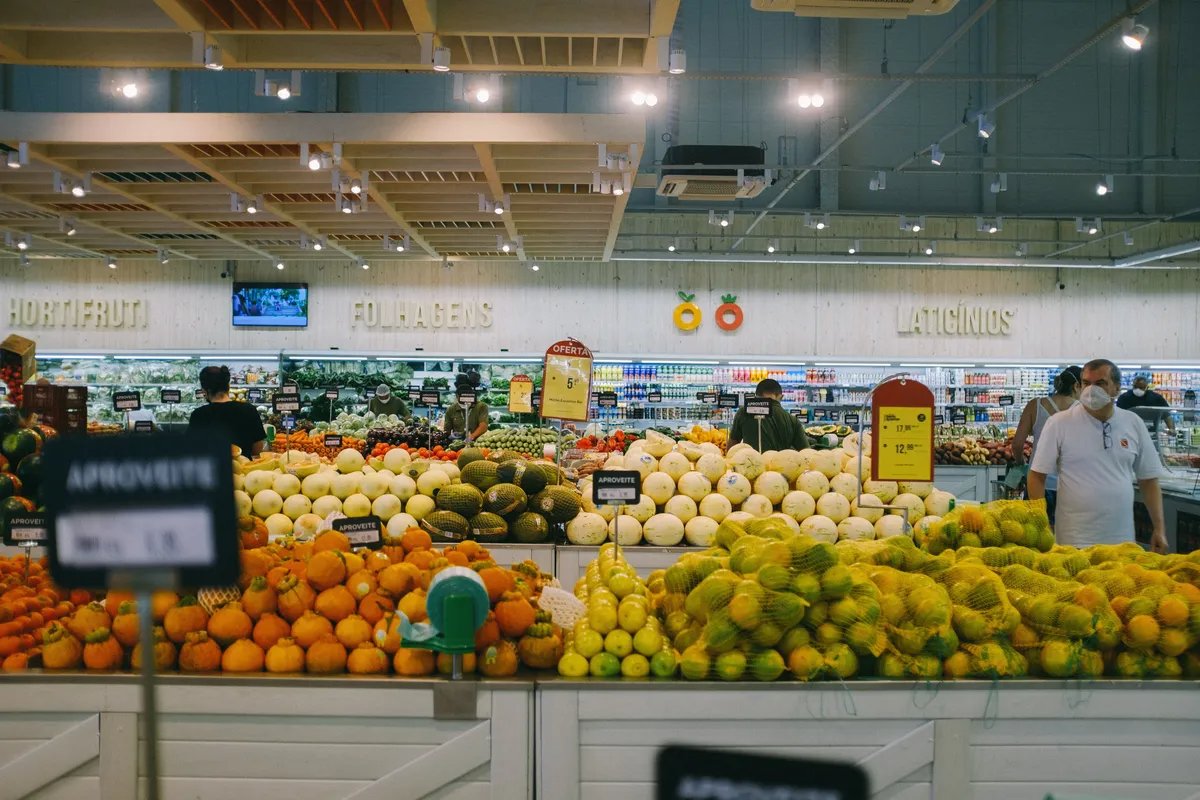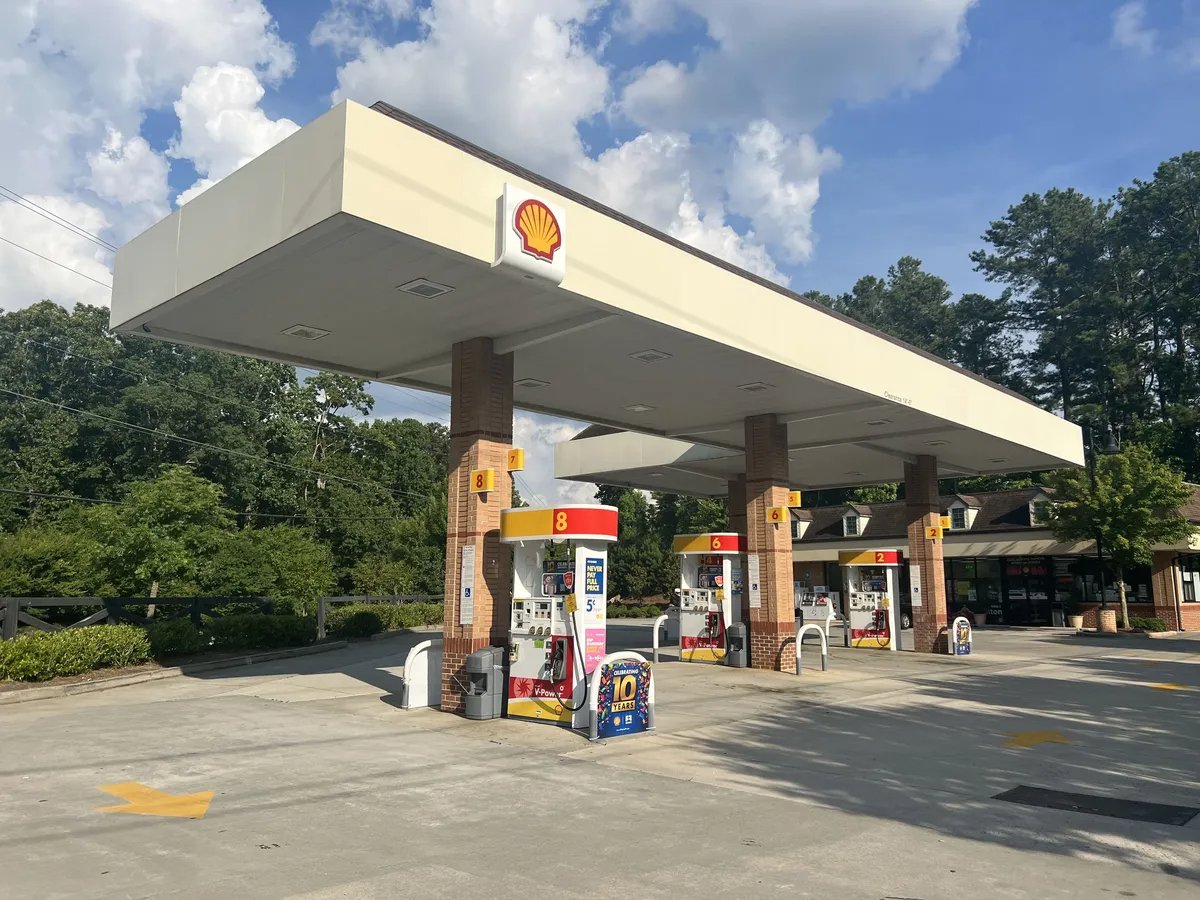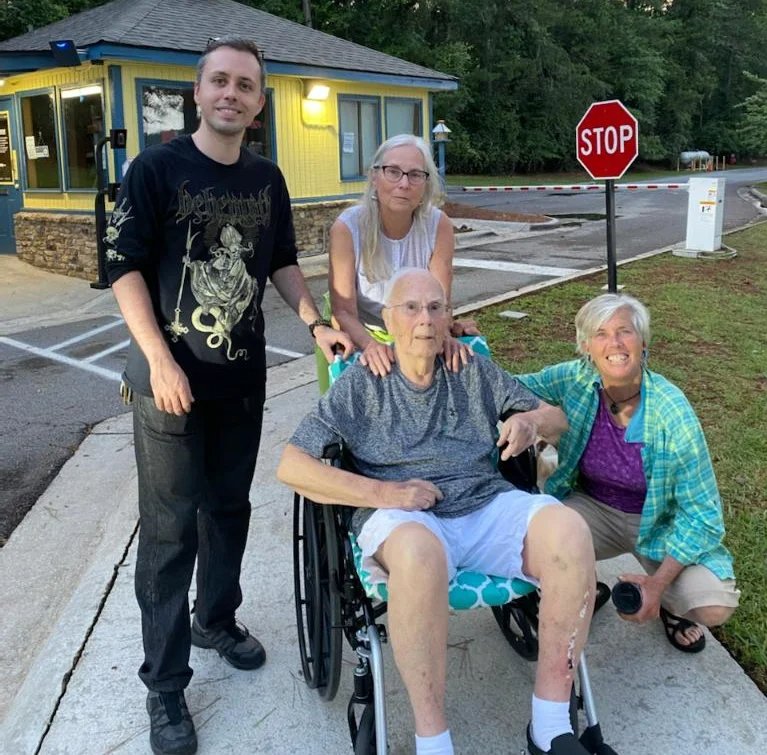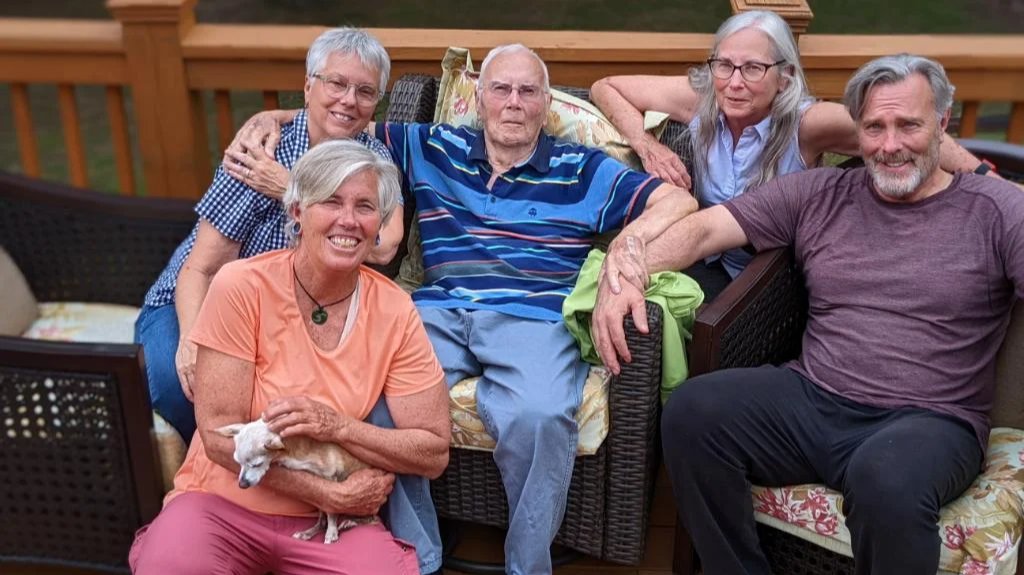Edwin Lowry has recently turned 95. Born in Canada, he immigrated to the United States as a child.
Ed is a military veteran. He served as a hospital corpsman in the US Navy and the Air Force. Then he spent about 20 years in reserve, working in a laboratory and doing cervical screening research. In the 90s, he retired.
Ed has a large family scattered throughout the country. The eldest daughter, 69-year-old Libby Blanton, settled in Virginia. Terry, 67, Marc, 62, and Christine, 60, are in New Mexico. The youngest son, 29-year-old Ian, lives in Georgia, like Ed himself.
All five children came to visit him prior to Father's Day, which this year was celebrated on 19 June. They rented a house in Buford, a small upstate town, for the weekend. A popular holiday destination among locals — Lake Lanier — is located in the town.
It was on the way there that I met the Lowry family.
The next day, they invited me over, warning that they were “not a typical American family”. We settled in a chilly living room — staying outside during the day was unbearably hot. I sat next to Ed. To be able to hear me, he turned his hearing aid on.
“This is all my family,” Ed says in a deep, raspy voice, slowly looking around at his children gathered around him. “I am here to enjoy their company for a few days.”
“And gas prices didn’t stop that,” jokes Marc Lowry, who is sitting across from his father. He often glances at his laptop: the work does not stop even during holidays. Marc is a criminal defence attorney based in Albuquerque.
Rising gas prices have been a sore subject for Americans in recent months. In June, the national average surpassed a record $5 per gallon (3.78 litre).
In Georgia, gas costs $4.69 (at the time of writing). The highest price is $6.30, in California.
The cost of gas follows the rise in oil prices. The spike happened after several countries, including the US, had imposed sanctions on Russia in response to a military invasion of Ukraine.
According to Reuters, overall, the inflation rate in the US reached 6.3% in May, which is three times more than the central bank’s official projection for this year — 2%.
“Inflation tightened up my budget,” says Ed. “But I haven’t had any difficulties financially with buying food and clothes. I can still handle it.”
“But no going to Disneyland, huh?” Marc once again teases his father.
“The gas prices have risen dramatically, but it didn’t alter my ability to buy gas, though I mostly use my bicycle to get around,” Terry joins the conversation. She lives in Gallup, a town in New Mexico near the Arizona border. “I work in a laboratory as well. I can still afford all the food that I want. I typically get my produce from the farmers market. We have four grocery stores in our entire town. And due to our location, we are kind of remote, there’s a lot of empty shelves. There are sometimes no milk or apples of the brand you want. There might not be things like broccoli or cilantro. One of the gentlemen at the grocery store said that he expects a 30% increase on the prices and more empty shelves.”

Photo: Dennis Siqueira. unsplash.com
Libby Blanton, Terry's older sister, recalls a similar food shortage at the start of the Covid-19 pandemic. Libby is a former librarian. She lives in Cumberland County, Virginia. The closest town to her house is Farmville.
“There are only two Walmart grocery stores where I live. At the beginning of the pandemic, Walmart thought they are doing us a great favour, because if you are over 65, you don’t want to fight the crowds. So they were having a senior citizen hour from 7 to 8 am. I got up early, I had my list, I went to Walmart — there was nothing to buy. And one of the managers said, it’s not like they were holding it back. They just didn’t have it. There was nowhere to buy toilet paper and paper towels. And you finally found it, you would buy the limit every time because you didn’t know when they were going to restock. And two years later, I am just getting to the end of my toilet paper,” Libby laughs.
According to Terry, food shortages and rising prices have a negative impact primarily on the indigenous population of America. In New Mexico, there are the Navajo, Hopi, and Zuni people, who live on remote reservations, but come to Gallup at weekends for shopping. Recently, Terry notes, they have appeared in the town less and less, because they need to save on gas.
“I have a friend who works for the food pantry. And she says, they have 200 more families that they are assisting because of the food shortage,” says Terry. “So I tend to go there to donate things more frequently.”
“That’s one thing we do to help them,” Libby continues. “There is also a sign in grocery stores that says WIC. It’s a federal program for women and children. They can buy certain products with their debit card for free. I try not to buy those things, so they stay on the shelf for those who don't have enough money. I’ll buy a more expensive item instead.
My husband and I are retired. We’re on a fixed income, we have good pensions and social security, and we have saved for retirement. So we are doing okay.”
Christine Lowry lives in New Mexico, a few hours from Terry, in a small town called Taos.
“Taos is pretty much a tourism based economy. I take people on tours on the river, and a lot of driving is involved. The gas prices and inflation probably cut my income by about 50% because there are fewer tourists coming to my town. It’s expensive,” says Chris, petting a chihuahua named Ginger sitting on her lap. “And again, we have a large indigenous population as well. But because of the Covid, all the reservations have shut down. You can’t go visit them, which also severely affected our tourist influx.”
But most of all, Chris notes, the life of the city was affected by a fire at Hermit Peak and Calf Canyon that had erupted in April. The reason — abnormally dry weather and strong winds. As of early June, according to The New York Times, the fire had destroyed more than 315,000 acres of forests. It is the largest fire in the US this year and the largest in New Mexico's history. According to Chris, by July, it was over, and Taos' life gradually got back to normal.
“Everyone is making it, though,” adds Chris. “No one has been like, I have to sell my house to livestock and leave. No one has gotten to that point yet. You can still pay bills, put gas in your car and buy food. Except now instead of buying a 12 pack of beer, maybe you buy… a beer.”
“Which is, probably, good for your waistline,” notes Mark, briefly looking up from his laptop.
Ian, the youngest of the Lowry family, agrees with his sister. He lives in the capital of Georgia — Atlanta. According to him, back when the pandemic had begun, the cost of food skyrocketed in areas where there is mass rapid transit. Now, apples have risen in price from $1 to $2, and a package of eggs — up to $6, “which hurts”.
“We are just going to be a little more frugal. I am not going to buy a very expensive drink, sushi or steak. I am not going to the bars as much. I used to go to the concerts all the time, like, five or six times a month. Now it’s two or three.”

A gas station in the suburbs of Atlanta. Photo: Georgii Manucharov
To compensate for the price of gas, Ian says, his girlfriend recently bought an electric car:
“But I know it’s not an option for a lot of people globally. They can’t just go and buy Tesla or Polestar 2 or any of the new EVs. That’s a big expense. It’s the people who are already living from paycheck to paycheck or below the poverty line that are going to be hurt because of the current economic situation. Atlanta has a bit of a homeless problem that’s not really being addressed. And it has just gotten significantly worse since the pandemic started. Since I work in real estate data, I see that housing prices, rent, and cost of purchasing have skyrocketed. A couple of friends bought a house outside the city, which is probably pretty standard. They got theirs for about 220 thousand dollars three years ago. It’s now doubled in price. Everything is getting more expensive. But we are not making any more money.”
I ask if the Lowry family thinks that the Russian invasion of Ukraine, followed by an embargo on Russian oil and gas by the European Union and the United States, is the reason for the rise in gas prices. But they, as it turns out, think there is a different reason.
“The day before Russia invaded Ukraine, gas was like 2 dollars. The very next day the war started and the gas went up 25 cents overnight,” says Terry. “They were selling us the same gas that’s still in their tank. There was no shortage. They just raised the price because they could.”
“Me personally, I think prices are artificially inflated. Oil companies are using the war as a reason so they can make as much money as they can. That’s all they care about,” agrees Chris.
According to Terry, the rise of gas prices in the US is directly related to the lack of refining capacity. After the start of the pandemic, when people had been forced to either self-isolate or reduce their mobility, the demand for fuel in the United States dropped significantly. Some refineries turned out to be unprofitable. In total, at least eight of them have been closed since 2020, including those in New Mexico.

From left to right: Ian, Terry, Ed, Chris. Photo: the family archive
“They are trying to open them back, but it’s hard. It’s not like you just turn the key, open the door and it’s in production. You have to take care of all the machinery…” Terry sighs. “Our refineries had probably a couple of hundred people at each one. They were great jobs. People made 100 thousand dollars a year. But now they are shut down. So I think the main reason for the big rise in gas production has to do with the refinery capacity, not with the war in Ukraine.”
Ian says that the state is not particularly interested in regulating oil production. In support of his words, he cites the landmark decision of the Supreme Court — Citizens United v. Federal Election Commission from 2010. It allowed corporations, as well as individuals, to spend unlimited amounts of money on advertising or other political tools to support (or to “destroy”) certain candidates.
“The United States political system has become inherently corrupt by big money politics, and especially the oil industry,” agrees Marc Lowry, finished with work by the end of the discussion. Then he turns to me: “But don’t take our word for it. Look around you. Where is effective public transportation?”
In the suburbs of Atlanta where I live, there are no buses or trams. To get to the nearest grocery store, you need to walk 30 minutes, to get to the park — almost an hour (by car it takes four and six minutes). The urban infrastructure forces you to either spend half your salary on taxi, or buy a car, maybe two.
“Effective public transportation doesn’t exist. No high speed rail for instance like Europe,” Marc continues. “You think that’s by design? It is.
Corporations want everybody to own a car, purchase gas and have insurance.”
Lowrys said that it was contributed by changing the planning and zoning. “So there was a town. You had your business, your apartment was upstairs. You didn’t need a car. You could walk on the street from shop to shop or ride a bike. And then they said — no, you can’t live behind your business. You have to have your own house out in the suburbs.”
“That was done so long ago. It was probably just to try to get working class people out of the cities,” says Ian, doubtful. “I don’t think it was even intended to be for oil profits.”
“It was, it was all,” say the rest.
“Remember California. They had this insane rail system in the 19th,” notes Chris. “They ripped the entire thing up because the car companies wanted everyone to have a car. And the oil companies wanted us all to drive alone and burn more gas.”
“I don’t disagree with any of the sentiment that the oil companies are gouging everybody and making a fortune,” sums up Marc. “But in my honest belief the oil prices have always been too cheap. The government should have stepped in years ago and racked up oil prices to balance out the environmental catastrophe we’re all going to face as humans. It doesn’t matter, if you are Vladimir Putin or pauper in New Guinea. We are all going to get hammered by global climate change. If we don’t rid ourselves of our addiction to fossil fuels, we’re fucked. And you can quote me on that.”
Georgia, USA
Join us in rebuilding Novaya Gazeta Europe
The Russian government has banned independent media. We were forced to leave our country in order to keep doing our job, telling our readers about what is going on Russia, Ukraine and Europe.
We will continue fighting against warfare and dictatorship. We believe that freedom of speech is the most efficient antidote against tyranny. Support us financially to help us fight for peace and freedom.
By clicking the Support button, you agree to the processing of your personal data.
To cancel a regular donation, please write to [email protected]

